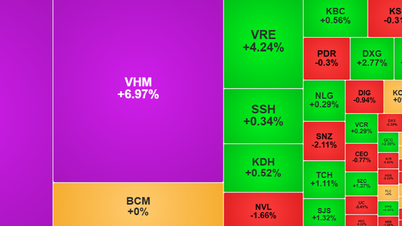In the context of the e-commerce boom, the last-mile logistics industry in Vietnam has recorded impressive growth over the past 5 years. It is forecasted that e-commerce logistics will continue to grow in the coming time.
In the context of the e-commerce boom, the last-mile logistics industry in Vietnam has recorded impressive growth over the past 5 years. It is forecasted that e-commerce logistics will continue to grow in the coming time.
According to statistics, from 2018 to 2024, the number of orders and parcels shipped is expected to have a compound annual growth rate of 39%, reaching more than 3 billion deliveries by 2024. This trend leads to an increasing demand for efficient logistics services in Vietnam, promoting the growth of e-commerce logistics services across the country.
New entrants such as SPX Express and Kex Express are expanding rapidly, with SPX Express leading the market with a projected CAGR of 283% between 2020 and 2030. In addition, companies such as J&T Express and Viettel Post continue to maintain strong double-digit growth momentum as they seize market opportunities.
With promising prospects, Vietnam’s last-mile delivery sector has attracted many businesses, including state-owned enterprises such as Viettel Post and VNPost, private companies such as Giao hang nhanh, Giao hang tiet kiem, and foreign companies such as Kex Express, Nin Sing Logistics, as well as e-commerce companies looking to penetrate the market. Each group of companies has implemented appropriate strategies to exploit the huge potential of the market amid the rising demand for fast and reliable delivery services.
As the last-mile delivery sector grows, companies are focusing on improving efficiency, innovation, and customer satisfaction to stay competitive. In recent years, e-commerce platforms have also developed logistics subsidiaries to stay competitive in terms of service quality and operational efficiency. For example, Lazada launched Lazada Express. With more than 70% of e-commerce orders concentrated in urban areas, companies are placing modern warehouses near major urban areas such as Bac Ninh and Binh Duong provinces.
Additionally, e-commerce platforms are also leveraging their global networks to develop cross-border e-commerce services, which are expected to grow at a compound annual growth rate of 28% from 2022 to 2027, according to Amazon.
To increase competitiveness and quickly gain market share, all companies in the last-mile delivery sector are actively improving operational efficiency by reducing delivery times and damage rates through technology upgrades. Companies are focusing on several key investment trends, including AI applications, lead-time optimization, robotic integration, and automation technology.
Viettel Post’s app, My Viettel Post, allows customers to track orders in real time, check deliveries, provide feedback and rate services, contributing to increased transparency in operations and customer engagement. Similarly, Ninja Van also leverages big data and real-time tracking systems to improve delivery visibility and enhance customer experience.
Efficient communication, real-time tracking, and integration between e-commerce platforms and delivery service providers have become essential to maintain an edge in the vibrant last-mile delivery market. Some notable collaborations include Ninja Van with Shopee, Viettel Post with Tiki, VNPost with Lazada, J&T Express with TikTok Shop.
For example, Viettel Post has invested in a modern sorting system, equipped with automated guided vehicles (AGVs) and advanced conveyor sorters, allowing it to process up to 1.4 million packages per day. Automation reduces reliance on manual labor, reduces operating costs and improves efficiency – a trend that other logistics companies can adopt to enhance their competitive advantage.
Vietnam’s last-mile delivery sector still has great potential thanks to the strong growth of e-commerce and the increasing demand from consumers for fast and reliable delivery services. However, the market is changing rapidly, especially in the technology sector, requiring businesses to stay updated with market trends and developments.
As competition intensifies, companies need to invest in advanced technologies such as AI, automation, and integrated systems to improve operational efficiency and reduce lead times. Companies that prioritize innovation and adaptability will be well positioned to capture new opportunities and help shape the future of last-mile delivery.
Source: https://baodautu.vn/logistics-thuong-mai-dien-tu-tiep-da-tang-truong-d228484.html



![[Photo] The Organizing Committee of the National Table Tennis Tournament of Nhan Dan Newspaper presented tables and books to universities in Da Nang.](https://vphoto.vietnam.vn/thumb/1200x675/vietnam/resource/IMAGE/2025/5/20/15c200538e76401ba0d4ca82ae5cb2ec)
![[Photo] Prime Minister Pham Minh Chinh chairs conference to promote public investment growth momentum](https://vphoto.vietnam.vn/thumb/1200x675/vietnam/resource/IMAGE/2025/5/20/7d1fac1aef9d4002a09ee8fa7e0fc5c5)

![[Photo] General Secretary To Lam receives Director of UNESCO World Heritage Center](https://vphoto.vietnam.vn/thumb/1200x675/vietnam/resource/IMAGE/2025/5/20/095c21a467bd453a93baaa2aa62d79dd)
































































































Comment (0)